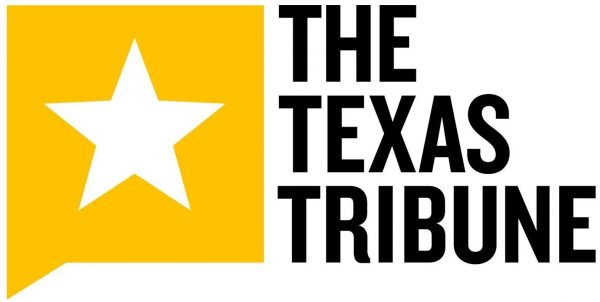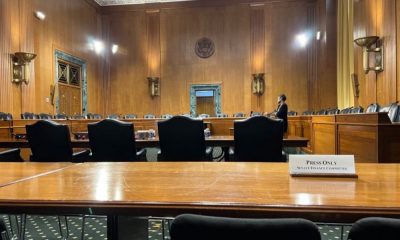Texas
Texas governor signs bill banning transgender youth healthcare
Senate Bill 14 to take effect on Sept. 1

By Alex Nguyen and William Melhado | Gov. Greg Abbott signed into law Friday a bill that bars transgender kids from getting puberty blockers and hormone therapies, though the new law could face legal challenges before it takes effect on Sept. 1.
Senate Bill 14’s passage brings to the finish line a legislative priority for the Republican Party of Texas, which opposes any efforts to validate transgender identities. Trans kids, their parents and LGBTQ advocacy groups fiercely oppose the law, and some have vowed to stop it from going into effect.
Texas — home to one of the largest trans communities in the U.S. — is now one of over a dozen states that restrict transition-related care for trans minors.
“Cruelty has always been the point,” said Emmett Schelling, executive director of the Transgender Education Network of Texas. “It’s not shocking that this governor would sign SB14 right at the beginning of Pride [month]; however this will not stop trans people from continuing to exist with authenticity — as we always have.”
Authored by New Braunfels Republican state Sen. Donna Campbell, the law bars trans kids from getting puberty blockers and hormone therapies, treatments many medical groups support. Children already receiving these treatments will have to be “weaned off” in a “medically appropriate” manner. The law also bans transition-related surgeries for kids, though those are rarely performed on minors.
Those who support the law claim that health care providers have capitalized on a “social contagion” to misguide parents and push life-altering treatments on kids who may later regret their decisions. SB 14’s supporters have also disputed the science and research behind transition-related care.
But trans kids, their parents and major medical groups say these medical treatments are important to protecting the mental health of an already vulnerable population, which faces a higher risk of depression and suicide than their cisgender peers. At the same time, doctors say cutting off these treatments — gradually or abruptly — could bring both physical discomfort and psychological distress to trans youth, some of whom have called it forced detransitioning.
In response, the American Civil Liberties Union, the ACLU of Texas, Lambda Legal and the Transgender Law Center pledged on May 18 to fight SB 14 in court. They have yet to file a lawsuit.
“Transgender people have always been here and will always be here,” Ash Hall, policy and advocacy strategist at the ACLU of Texas, said Friday. “Our trans youth deserve a world where they can shine alongside their peers, and we will keep advocating for that world in and out of the courts.”
This legal threat is not new; some of these groups have sued several other states over their restrictions. Earlier this year, the Department of Justice also joined the legal fight against Tennessee’s ban.
While the lawsuits are tailored to each state, Sasha Buchert, a senior attorney at Lambda Legal and the director of its Nonbinary and Transgender Rights Project, told the Texas Tribune last month that a major common challenge to the laws hinges on the 14th Amendment’s Equal Protection Clause and the argument that these laws are stopping trans kids from accessing the same medical treatments that are still available to their cisgender peers.
Buchert added that the lawsuits’ immediate goal is generally to get a preliminary injunction to stop these laws from taking effect, a tactic that has seen some success.
“It’s one thing to see some of the things that state legislators do, but it’s a completely different thing when you’re under the white-hot spotlight of judicial scrutiny,” she said.
And prior to SB 14, the ACLU and Lambda Legal successfully sued Texas last year to halt state-ordered child abuse investigations of parents who provide their trans kids with access to transition-related care. Impeached Attorney General Ken Paxton later appealed the decision in March, but the 3rd Court of Appeals has yet to issue a ruling on it.
“It’s a privilege to be able to fight,” Buchert said about the ongoing court challenges that Lambda Legal is involved in.
Editor’s note:
In a late Friday evening phone call, Landon Richie, with the Transgender Education Network of Texas, told the Washington Blade:
“Today Governor Abbott signed cruelty into law. Legislation that purports to ‘protect youth’ while stripping them of the life-saving, life-giving care that they receive will cost lives, and that’s not an exaggeration. Trans kids deserve not only to exist, but to thrive as their authentic selves in every facet of their lives, and we will never stop fighting to to actualize a world where that is undisputed. Despite efforts by our state, trans people will always exist in Texas, as we always have, and we will continue to exist brilliantly and boldly, and with endless care for one another.”
******************************************************************************************
The preceding article was previously published by The Texas Tribune and is republished by permission.
The Texas Tribune is a nonprofit, nonpartisan media organization that informs Texans — and engages with them — about public policy, politics, government and statewide issues.
Disclosure: The ACLU of Texas has been a financial supporter of The Texas Tribune, a nonprofit, nonpartisan news organization that is funded in part by donations from members, foundations and corporate sponsors. Financial supporters play no role in the Tribune’s journalism. Find a complete list of them here.
**********************
Quality journalism doesn’t come free
Perhaps it goes without saying — but producing quality journalism isn’t cheap. At a time when newsroom resources and revenue across the country are declining, The Texas Tribune remains committed to sustaining our mission: creating a more engaged and informed Texas with every story we cover, every event we convene and every newsletter we send. As a nonprofit newsroom, we rely on members to help keep our stories free and our events open to the public. Do you value our journalism? Show us with your support.
Donation Link Here
Texas
Pornhub blocks Texas accessing site over age verification law
Court battle forced statute to take effect

Aylo (formerly MindGeek) the largest global adult online entertainment conglomerate, owned by Canadian private equity firm Ethical Capital Partners, has restricted access to its platforms including its flagship Pornhub in Texas after a court battle forces the state’s age verification law to take effect.
Texas Republican Attorney General Ken Paxton had appealed a U.S. District Court decision that enjoined him from enforcing House Bill 1181. Paxton and others argued that purveyors of obscene materials online needed to institute reasonable age-verification measures to safeguard children from pornography.
A week ago the 5th U.S. Circuit Court of Appeals partially vacated the original injunction, ruling that the age verification requirements are constitutional.
“Applying rational-basis review, the age-verification requirement is rationally related to the government’s legitimate interest in preventing minors’ access to pornography,” the three judge panel of the 5th Circuit explained. “Therefore, the age-verification requirement does not violate the First Amendment.”
While the court vacated the injunction against the age-verification requirement of the statute, it upheld the lower court’s injunction against a separate section of the law that would require pornography websites to display a health warning on their landing page and all advertisements.
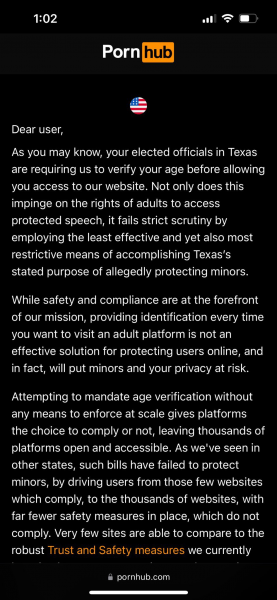
The Houston Chronicle reported people who go to the site are now greeted with a long message from the company railing against the legal change as “ineffective, haphazard, and dangerous.” The company calls for age verification by the makers of devices that let people on the internet, instead of individual websites.
Age verification legislation was enacted in several states in 2023 in addition to Texas, including North Carolina, Montana, Arkansas, Louisiana, Mississippi, Utah and Virginia.
The new laws require users to provide digital confirmation via a certified approved third party vendor like London-based digital identity company Yoti. The other possibility would be a state approved digital ID such as the California DMV’s Wallet app, which contains a mobile driver’s license.
Users accessing Pornhub from within Louisiana are presented with a different webpage that directs them to verify their age with the state’s digital ID system, known as LA Wallet. The law passed in 2022 subjects adult websites to damage lawsuits and state civil penalties as high as $5,000 a day if they fail to verify that users are at least 18 years old by requiring the use of digitized, state-issued driver’s licenses or other methods.
The Associated Press reported this past October that an adult entertainment group’s lawsuit against a Louisiana law requiring sexually explicit websites to verify the ages of their viewers was dismissed by U.S. District Judge Susie Morgan in New Orleans.
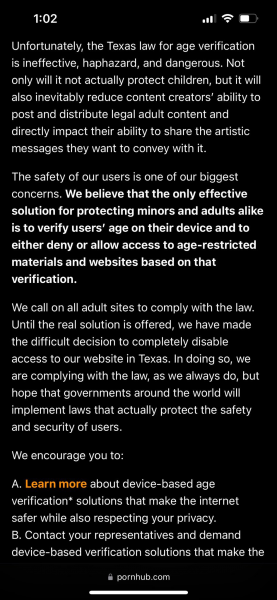
Potential or existing Pornhub users in North Carolina and Montana are directed to a video that features adult film star Cherie DeVille, who recites a message also written under the video.
“As you may know, your elected officials in your state are requiring us to verify your age before allowing you access to our website. While safety and compliance are at the forefront of our mission, giving your ID card every time you want to visit an adult platform is not the most effective solution for protecting our users and in fact, will put children and your privacy at risk.”
“Mandating age verification without proper enforcement gives platforms the opportunity to choose whether or not to comply,” the statement continues. “As we’ve seen in other states, this just drives traffic to sites with far fewer safety measures in place.”
“Until a real solution is offered, we have made the difficult decision to completely disable access to our website in [the aforementioned locales]” the message ends with.
The company previously blocked Utah on May 7, 2023. CNN reported at the time:
Affected users are shown a message expressing opposition to Senate Bill 287, the Utah law signed by Gov. Spencer Cox in March that creates liability for porn sites that make their content available to people below the age of 18.
“As you may know, your elected officials in Utah are requiring us to verify your age before allowing you access to our website,” the message said. “While safety and compliance are at the forefront of our mission, giving your ID card every time you want to visit an adult platform is not the most effective solution for protecting our users, and in fact, will put children and your privacy at risk.”
Courthouse News reported that after Virginia’s bill was passed in June, state Sen. L. Louise Lucas, a Democrat, criticized the state for not creating a system for age verification, and instead leaving it up to websites to manage the process, citing security risks.
“We passed a bill during this session to protect children from online porn. However the executive branch had an obligation to create a system for age verification,” Lucas said on X, formerly Twitter. “We will continue our work to keep pornography out of the hands of minors … but we will also work to ensure that this Governor’s error does not put the privacy of Virginians at further risk.”
Beyond the U.S. in the European Union, Pornhub and two more of the world’s biggest porn websites face new requirements in the European Union that include verifying the ages of users, under the EU’s Digital Services Act.
According to a December 20 report from the Associated Press, Pornhub, XVideos and Stripchat have now been classed as “very large online platforms” subject to more stringent controls under the Digital Services Act because they each have 45 million average monthly users, according to the European Commission, the EU’s executive branch.
They are the first porn sites to be targeted by the sweeping Digital Services Act, which imposes tough obligations to keep users safe from illegal content and dodgy products, the Associated Press reported last month.
In addition to the adult entertainment websites, any violations are punishable by fines of up to 6% of global revenue or even a ban on operating in the EU. Some 19 online platforms and search engines have already been identified for stricter scrutiny under the DSA, including TikTok, Amazon, Facebook, Instagram, Google and more.
Texas
Abbott tells UN to ‘pound sand’ amid criticism of anti-LGBTQ policies in Texas
Governor signed seven anti-LGBTQ laws last year
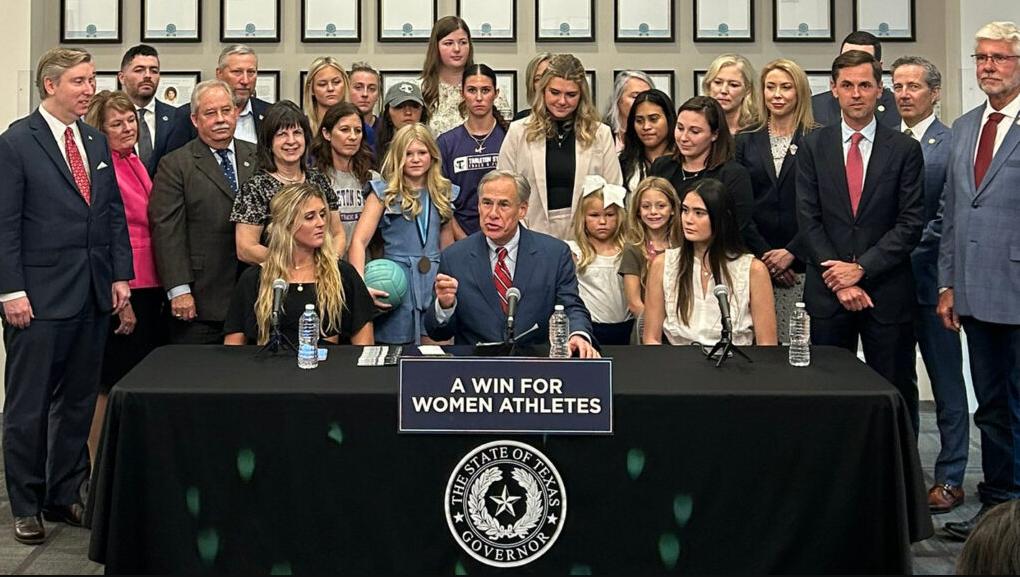
Texas Gov. Greg Abbott (R) on Sunday dismissed news coverage of a letter issued last month to the United Nations that expressed alarm over the “deteriorating human rights situation” for LGBTQ people in the Lone Star State.
Signed by Equality Texas, ACLU of Texas, GLAAD, the Human Rights Campaign, and the University of Texas at Austin School of Law Human Rights Clinic, the letter details how Texas legislators introduced 141 bills targeting the LGBTQ community, passing seven into law.
“The UN can go pound sand,” Abbott wrote in a post on X.
The UN can go pound sand. https://t.co/JpWguPHGHJ
— Greg Abbott (@GregAbbott_TX) February 25, 2024
In 2023, the governor signed a ban on gender affirming care for transgender youth, a ban on diversity, equity, and inclusion programs at public universities, a ban on transgender athletes competing in college sports, a law allowing schools to use religious chaplains for counseling services, a ban on “sexually oriented performances” on public property accessible to minors (which targets drag shows), a law allowing schools to restrict LGBTQ books, and a ban on nondiscrimination ordinances by local governments.
The groups argued in their letter that these policies constitute a “systemic discriminatory policy” in violation of international human rights laws, such as the International Covenant on Civil and Political Rights, a multilateral treaty whose tenets are enforced by the UN Human Rights Committee.
Texas
Houston police: Lakewood Church shooter was not transgender
Far-right extremists fueled unsubstantiated, false narratives

In the hours after Genesee Moreno, a 36-years-old Latina woman, entered the sanctuary of Joel Osteen’s mega Lakewood Church and opened fire with an assault rifle this past Sunday, there were multiple instances of confusion over her gender identity, in part fueled by unsubstantiated or false narratives from far-right extremists.
During a briefing with reporters yesterday, Houston Police Department homicide commander Christopher Hassig stated with absolute clarity that Moreno was not a transgender person.
“Our shooter is identified by a driver’s license as Genesee Moreno, 36-years-old, Hispanic female. There are some discrepancies. We do have reports she used multiple aliases, including Jeffrey Escalante. So she has utilized both male and female names but through all of our investigation to this point, talking with individuals, interviews, documents, Houston Police Department reports, she has identified this entire time as female,” Hassig told the media.

In initial coverage, KHOU and the Houston Chronicle reported Moreno, who had used the name Jeffery Escalante, had an extensive criminal history dating back to 2005 according to a Texas Department of Public Safety records search. Prior arrests include failure to stop and give information, assault of a public servant, assault causing bodily injury, forgery, possession of marijuana, theft, evading arrest and unlawful carrying weapon.
Media outlets including Fox News and even NBC News who later retracted a portion of their story mistakenly framed the context as “a person who previously identified as male” which led to the incorrect framing of Moreno’s gender identity.
Far-right extremist pundits and at least one anti-trans member of the U.S. House of Representatives took up the “shooter was trans” narrative.
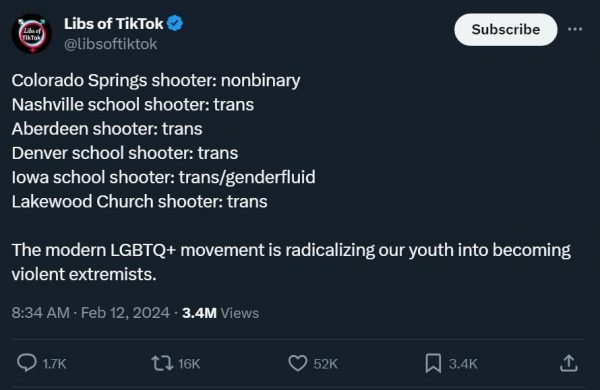
Chaya Raichik’s post had a companion extremist anti-trans X post by U. S. Rep. Marjorie Taylor Greene (R-Ga.), who republished a post by far-right media Blaze TV anchor Sara Gonzales, both falsely claiming Moreno was trans. Gonzales’ post appeared to contain a criminal record without attribution of its source.
Raichik also posted the same “criminal record” on her social media accounts.
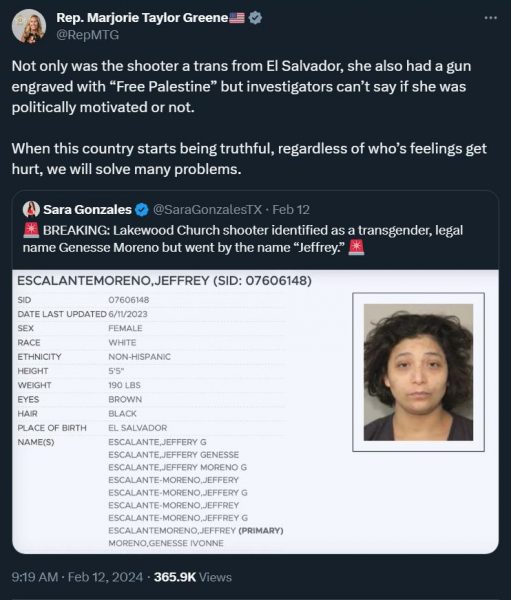
Fox News also ran misleading and false headlines regarding Moreno’s gender identity.
Alejandra Caraballo, a trans attorney and clinical instructor at the prestigious Harvard Law Cyberlaw Clinic who also writes on gender and technology issues for Wired and Slate magazines, debunked the Fox News allegations and called out the far-right anti-trans extremists.
“Far right extremist accounts like Libs of Tiktok rushed to call the shooter at Joel Osteen’s church a transgender woman. The police have just confirmed that is not the case and she was the biological mother of the child who was shot. They won’t apologize or retract their lies,” Caraballo said.
Oh no you don't Fox News, you don't get to make incendiary claims without evidence and then stealth edit your articles without a full retraction and correction. pic.twitter.com/o1bnJwVYi0
— Alejandra Caraballo (@Esqueer_) February 12, 2024
Ari Drennen, executive director of Media Matters of America’s LGBTQ Project, cautioned Tuesday the falsehoods and fabrications are “adding fuel to a moral panic” on trans issues as multiple state legislators rush to pass anti-trans laws:
A far-reaching media narrative has incorrectly identified the alleged armed assailant at a Texas megachurch as a transgender woman, adding fuel to a moral panic as legislators across the country push a raft of laws restricting the lives of trans people in the United States. 🧵 pic.twitter.com/OspQnHpGMp
— Ari Drennen (@AriDrennen) February 13, 2024
-

 District of Columbia2 days ago
District of Columbia2 days agoReenactment of first gay rights picket at White House draws interest of tourists
-

 District of Columbia2 days ago
District of Columbia2 days agoNew D.C. LGBTQ+ bar Crush set to open April 19
-

 Arizona2 days ago
Arizona2 days agoAriz. governor vetoes anti-transgender, Ten Commandments bill
-

 Africa4 days ago
Africa4 days agoUgandan activists appeal ruling that upheld Anti-Homosexuality Act

